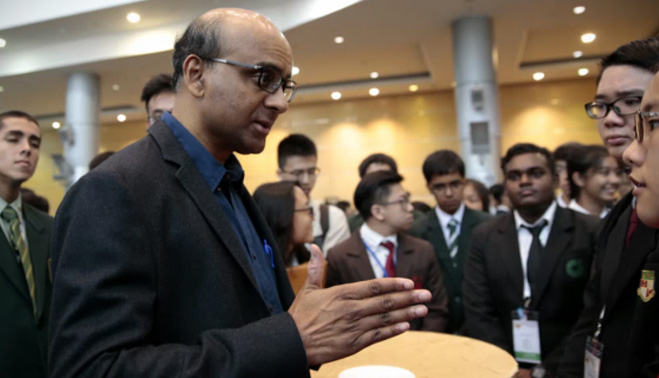![]() Home > Singapore
Home > Singapore
More Flexible Ways Of Learning Needed For Jobs Of Future: DPM

DPM Tharman Shanmugaratnam speaks with students after the pre-university seminar opening ceremony on May 30, 2016. Photo: Jason Quah/TODAY
![]() May 31st, 2016 | 08:26 AM |
May 31st, 2016 | 08:26 AM | ![]() 1683 views
1683 views
SINGAPORE
Tharman shares with students his vision of an innovative, deeply inclusive society in 2035
Imagine a future where one’s chip-sized wearable device monitors his vital health statistics and reminds him of what he needs to do.
Or one where bundled mobility solutions are the norm, offering commuters some hours of car usage, a number of public transport and taxi rides and unlimited bicycle usage — the way telcos today offer bundled plans to consumers.
And instead of cleaning hawker centres, which would be taken care of by machines, some Singaporeans would be smart-home handymen earning good wages.
Sketching out a vision of an innovative and inclusive Singapore 20 years down the road at a seminar for pre-university students yesterday, Deputy Prime Minister Tharman Shanmugaratnam called on them to develop a sense of individuality as well as a spirit of solidarity.
Jobs and learning will be very different, resulting in a cultural landscape that is less hierarchical, he told about 550 students from junior colleges, polytechnics and Millennia Institute at the opening of the four-day Pre-University Seminar, held at Nanyang Technological University.
Before the seminar, Mr Tharman had asked for a survey of what the participants hoped to achieve from their education and the factors that would influence their career choices, among other things.
Facilitated by Hwa Chong Institution, which co-organised this year’s seminar with the Ministry of Education, the online survey of about 330 students found that satisfaction at work and the ability to make the most of their talents factored “quite strongly” in career choice, said Mr Tharman.
And more than 90 per cent of respondents felt an innovative society, as well as social harmony and understanding among people, were qualities important in shaping Singapore’s future.
Painting a vision of Singapore in 2035 from the students’ views, Mr Tharman said it would be an innovative and deeply inclusive society.
Jobs in demand could include software engineers and developers, data scientists, various healthcare professionals, professions facilitating lifelong learning such as freelance lecturers, and designers, he said.
There would be less demand for lawyers, insurance and real estate agents, radiologists, and accountants. This is because technology would make it possible for customers to get what they want at low cost, he said in his speech.
How demand balances out is too early to say. Mr Tharman noted that many societies fear job losses will exceed jobs created, but Singapore can avoid this because it is small but has a global market. However, it needs to respond quickly and take advantage of technology as well as the productive combination of humans collaborating with robots, he said.
A more fluid job market will mean the blurring of lines between the academic and practical, degree and non-degree, and white- versus blue-collared, said Mr Tharman. Education will become more flexible and open, with the intense rush to learn as much as possible in the first stage of life to become “hopelessly outdated”.
Mr Tharman also expressed confidence that innovation would result in Singapore firms and brands being leaders, with a reputation for being safe and ethical, and with attitude and character. “We would have had our Angry Birds moment in the 2020s,” he said.
Inclusiveness would see a future where children who benefited from the KidSTART pilot initiative — which provides low-income and vulnerable children aged six and below with early access to health, learning and developmental support — are among the top band of PSLE scorers, Mr Tharman said.
Co-curricular activities would be less ethnically defined while retaining their authenticity, and Singaporeans would be resilient and remain bonded in the wake of any terror attack.
But there is a deeper tension between innovation and inclusiveness, he said. Innovation and breakthroughs spring from original minds, but such individuality must not mean Singapore becomes an individualistic society where it is each man for himself, he said.
Individuals must respect one another and Singapore must retain strong consensus in the middle of society even as its people have diverse views and lifestyles, he said. “It is not a contradiction; it can be achieved and we will achieve it. And your generation especially is going to make that Singapore possible for yourselves. Twenty years from now, we will still be a little red dot, always will be. But it will be a deep red dot, the colour of the Singapore heart.”
Source:
courtesy of TODAY
by Neo Chai Chin
If you have any stories or news that you would like to share with the global online community, please feel free to share it with us by contacting us directly at [email protected]